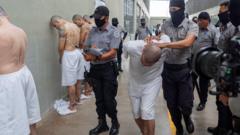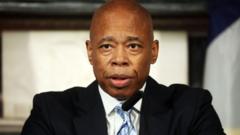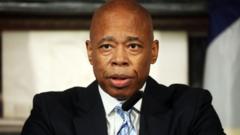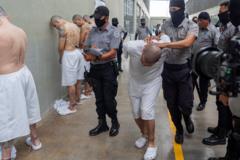The Trump administration has deported 17 alleged gang members to El Salvador, including individuals from prominent criminal groups, despite ongoing legal battles over deportation policies. Salvadoran officials confirmed the deportees' identities and crimes, while human rights advocates continue to voice concerns over the legality and human rights implications of these actions.
US Increases Deportations of Alleged Gang Members to El Salvador

US Increases Deportations of Alleged Gang Members to El Salvador
Seventeen individuals associated with gang activity have been deported by the Trump administration amid legal controversies regarding their removals.
The Trump administration has deported another 17 alleged gang members back to El Salvador as part of an ongoing effort to combat organized crime, U.S. Secretary of State Marco Rubio announced. This recent action comes in the wake of legal controversies surrounding the deportation process linked to the Alien Enemies Act, a 1798 law primarily utilized in times of war.
According to Rubio, the deportees included individuals associated with notorious gangs such as Tren de Aragua and MS-13. Officials from the Salvadoran government highlighted that among those deported, there is a diverse group of individuals, including both Venezuelan and Salvadoran nationals.
Previously, a court mandated that deportations under the Alien Enemies Act be halted. However, media sources reported that the recent deportations were executed under standard immigration laws rather than the contentious Act. Rubio characterized the deportees as "murderers and rapists," although he did not provide specific names, details regarding their alleged crimes, or any confirmation of convictions.
In a controversial move, El Salvador’s President Nayib Bukele shared an edited video snippet via social media, displaying shackled deportees arriving in El Salvador, undergoing haircuts, and being confined to prison cells. He proclaimed that all individuals were confirmed murderers and perpetrators of severe crimes, including child rapists. Bukele framed the operation as part of a broader strategy against terrorism and organized crime in the region, receiving support from former President Trump, who criticized President Biden’s administration for previously allowing these individuals into the U.S.
El Salvador has agreed to accept these deportees in return for $6 million in support. However, relatives of some individuals previously sent to the supermax prison claim that their family members have no links to criminal organizations.
Amidst rising tensions regarding the application of the Alien Enemies Act, organizations such as the American Civil Liberties Union have filed lawsuits alleging illegality regarding deportation practices. In recent court proceedings, a federal judge issued a temporary restraining order against the implementation of the Act, yet deportation flights continued.
The situation is actively evolving, with another court hearing set to take place shortly. The legal and social implications of these deportations remain a hot topic of debate, as advocates question the human rights impact on the deportees and their families.





















